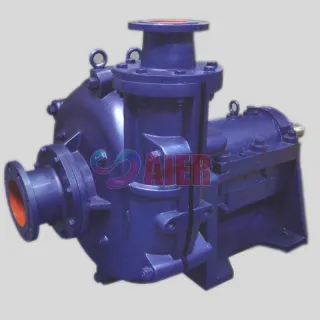Dec . 18, 2024 17:52 Back to list
slurry pump impeller material factories
The Importance of Impeller Material in Slurry Pump Factories
In the world of slurry pumps, the impeller is a critical component that significantly influences the efficiency and longevity of the pump. The selection of the right impeller material is paramount, especially in factories that rely heavily on slurry pumps for their operations, such as mining, construction, and wastewater treatment industries. This article delves into the various aspects of impeller materials used in slurry pumps, the factors to consider when selecting an impeller material, and the advancements in technology that are shaping the future of slurry pump manufacturing.
Understanding Impellers in Slurry Pumps
Slurry pumps are designed to transport a mixture of liquids and solids, often abrasive and corrosive in nature. The impeller's primary function is to impart kinetic energy to the slurry, facilitating its movement through the pump. Given the demanding environment in which these pumps operate, the material used for the impeller must possess certain properties, including high wear resistance, corrosion resistance, and sufficient tensile strength.
Common Materials Used in Impellers
1. Cast Iron Traditionally, cast iron has been a popular choice for slurry pump impellers due to its excellent wear resistance and cost-effectiveness. However, it may not withstand highly corrosive environments and can be prone to cracking under stress.
2. High Chrome Alloys These are particularly well-suited for abrasive applications. High chrome impellers offer superior hardness and are resistant to wear, making them ideal for handling coarse and rocky slurries.
3. Rubber Linings In scenarios where corrosive slurries are prevalent, rubber-lined impellers are used. The elastic properties of rubber provide a cushioning effect, reducing the impact on the impeller and enhancing its lifespan in corrosive environments.
4. Stainless Steel For applications that require both abrasion and corrosion resistance, stainless steel impellers are an excellent choice. They are particularly useful in the food processing and pharmaceutical industries, where hygiene is paramount.
slurry pump impeller material factories

5. Composite Materials As technology advances, composite materials are becoming more common. They offer the benefits of lightweight construction along with high strength and resistance to corrosion and wear.
Factors to Consider When Selecting Impeller Materials
The choice of impeller material should consider several factors
- Nature of the Slurry Understanding the composition of the slurry—such as particle size, shape, and chemical properties—is essential in selecting the appropriate material. - Operating Conditions The environment in which the slurry pump operates (temperature, pressure) can affect material performance. High temperatures may require materials with specific thermal properties. - Cost Considerations While premium materials may offer better performance, balancing cost with durability and efficiency is crucial for long-term operations. - Maintenance and Replacement Some materials may require more frequent maintenance or replacement, which can add to operational costs.
Advancements in Impeller Technology
The slurry pump industry is witnessing significant advancements in materials science and engineering. Techniques such as 3D printing and the incorporation of advanced polymers are allowing manufacturers to produce impellers with complex geometries and superior properties. These advancements lead to reduced maintenance costs and improved efficiency, benefiting facilities that rely on slurry pumps.
Additionally, the integration of smart technologies, such as sensors and IoT (Internet of Things), enables real-time monitoring of the impeller's performance. This can lead to predictive maintenance practices, ensuring that potential failures are addressed before they disrupt operations.
Conclusion
In conclusion, the choice of impeller material in slurry pump factories is crucial for optimizing performance and durability. As industries evolve, so too do the materials and technologies available for manufacturing impellers. By understanding the specific requirements of their operations and the nature of the slurries they handle, factory managers can make informed decisions that enhance efficiency, reduce downtime, and ultimately lead to greater profitability. As technology continues to advance, we can expect even more innovative solutions that will shape the future of slurry pump manufacturing.
-
Top Submersible Pump Companies High Quality Manufacturers & Suppliers in China
NewsJul.08,2025
-
High Quality Seal for 5 Inch Dredge Pump Reliable China Manufacturer & Supplier
NewsJul.08,2025
-
High-Efficiency Slurry Sand Pump from Leading China Manufacturer – Durable & Reliable Solutions
NewsJul.07,2025
-
High-Quality Slurry Pump Made in China Durable Steel Mill Slurry Pump & Parts
NewsJul.07,2025
-
High Quality Excavator Dredge Pump Manufacturer & Suppliers from China – Reliable, Durable, Efficient Solutions
NewsJul.07,2025
-
Wholesale Slurry Pump Closed Impeller Supplier High Efficiency China Slurry Pump Closed Impeller
NewsJul.06,2025
